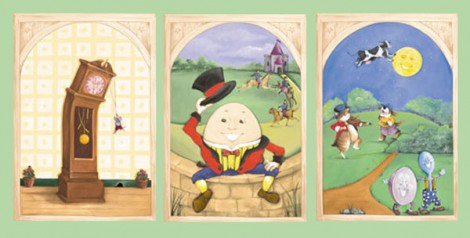
I’ve often wondered why the generations who’ve come before us have done things the way that they have, and then these things started falling by the wayside a little, and now they’ve started making a bit of a resurgence… like for instance nursery rhymes.
I remember a few years back when Beverley Hughes tried to start up a ‘parenting workforce’ to find and support new parents – or force new parents,as some reported it- in teaching children nursery rhymes.
At the time, Mrs Hughes said that “those who fail to read stories or sing to their youngsters threaten their children’s futures, and the state must put them right.”
While I can’t say I’m in favour of the concept of Nursery Rhyme Police barging in and interrogating my daughter about how many blind mice there were or what the mouse ran up or what the cat frightened under the queen’s chair – what is it with mice in nursery rhymes, anyway? – I much prefer the way they did do it in the end…. With Rhyme Time and Book start sessions at the libraries.
I know that when I started attending these sessions with my daughter, I was shocked to discover how many nursery rhymes I’d simply forgotten.
I’ve been mulling over all this for the last couple of days, since reading in the Gaurdian about anew book by Sally Goddard Blythe, a consultant in neuro-developmental education education and director of the Institute for Neuro-Physiological Psychology, and author of the book “The Genius of Natural Childhood.”
According to claims in the book, ‘signature’ melodies and inflections of traditional rhymes prepare children’s brains for language.
"Song is a special type of speech. Lullabies, songs and rhymes of every culture carry the 'signature' melodies and inflections of a mother tongue, preparing a child's ear, voice and brain for language."
According to the article, growing numbers of children enter nursery and school with inadequate language and communication skills often because their parents have not helped them develop communication skills.
So, just sticking on a CD of nursery rhymes will improve your child’s chances of success in life? Well, no. According to Blythe, "Babies are particularly responsive when the music comes directly from the parent. Singing along with a parent is (I'm sure there's a word missing here) for the development of reciprocal communication."
In fact, former minister Hughes was quoted as saying that singing nursery rhymes with young children will get them off to a flying start. And while I’m sure there’s more to it than that – such as that singing with children implies spending time with them – a few songs a day can’t be that hard, can it? After all, before modern science and child experts and psycho-babble and all that, our forefathers were doing it, so they must have known something that we're only just realising.
Image Credit: Beetlebugs.net
















Comments